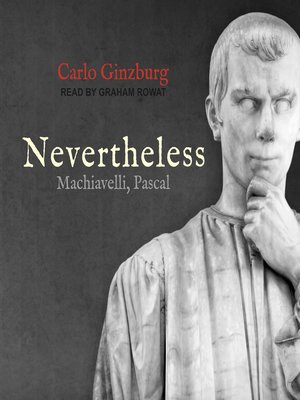
Sign up to save your library
With an OverDrive account, you can save your favorite libraries for at-a-glance information about availability. Find out more about OverDrive accounts.
Find this title in Libby, the library reading app by OverDrive.



Search for a digital library with this title
Title found at these libraries:
| Loading... |
Nevertheless comprises essays on Machiavelli and on Pascal. The ambivalent connection between the two parts is embodied by the comma (,) in the subtitle: Machiavelli, Pascal. Is this comma a conjunction or a disjunction? In fact, both. Ginzburg approaches Machiavelli's work from the perspective of casuistry, or case-based ethical reasoning. For as Machiavelli indicated through his repeated use of the adverb nondimanco ("nevertheless"), there is an exception to every rule. Such a perspective may seem to echo the traditional image of Machiavelli as a cynical, "Machiavellian" thinker. But a close analysis of Machiavelli the reader, as well as of the ways in which some of Machiavelli's most perceptive readers read his work, throws a different light on Machiavelli the writer. The same hermeneutic strategy inspires the essays on the Provinciales, Pascal's ferocious attack against Jesuitical casuistry. Casuistry vs anti-casuistry; Machiavelli's secular attitude towards religion vs Pascal's deep religiosity. We are confronted, apparently, with two completely different worlds. But Pascal read Machiavelli, and reflected deeply upon his work. A belated, contemporary echo of this reading can unveil the complex relationship between Machiavelli and Pascal-their divergences as well as their unexpected convergences.






